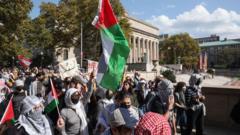In a concerning development for pro-Palestinian activists in the United States, Mohsen Mahdawi, a Palestinian student at Columbia University, was detained by immigration officials while attending an interview critical to his U.S. citizenship application. His lawyer claims that the arrest was a direct retaliation for his active role in protests advocating for Palestinian rights, which have surged in light of ongoing violence in Gaza.
Mahdawi, who has permanent resident status since 2015 and is set to graduate next month, was taken into custody on Monday in Colchester, Vermont. Legal representatives argue that his detention marks an alarming trend toward the silencing of dissent at U.S. academic institutions. The lawyer, Luna Droubi, filed for a temporary restraining order against U.S. Immigration and Customs Enforcement (ICE), citing that Mahdawi's arrest is unconstitutional and indicative of an effort to suppress advocacy work related to the Palestinian cause.
Witnesses uploaded video evidence to social media showing Mahdawi being escorted by two officers, increasing demands for transparency regarding his situation. Droubi revealed that Mahdawi, who was born in a refugee camp in the West Bank, embodies values of non-violence and empathy central to his Buddhist beliefs.
His case echoes broader immigration issues, particularly amidst a crackdown on foreign students by the Trump administration. Just last month, U.S. Secretary of State Marco Rubio acknowledged a significant number of visa revocations targeting foreign students, aimed ostensibly at combating antisemitism on college campuses. Still, many critics assert that these measures unjustly label dissenters and infringe on their right to free speech.
Vermont Senator Bernie Sanders publicly condemned the detention, emphasizing Mahdawi's right to due process. In parallel, another Columbia activist, Mahmoud Khalil, and Tufts University student Rumeysa Ozturk have faced similar fates, drawing attention to the heightened risks for students advocating for Palestinian rights.
As legal battles play out, the implications of these arrests raise troubling questions about the future of free expression and immigrant rights in the United States.




















